The process of improving your website for search engines is known as search engine optimization (SEO) . One of the most crucial components of SEO is on-page optimization. It entails improving your website's content and architecture to make it more appealing to consumers and search engines alike.
Why On-Page SEO Is Important
In order for search engines to recognise your website's content and how relevant it is to a user's search query, on-page SEO is crucial. You may improve your chances of ranking higher in search engine results, which may result in more visitors and revenue, by optimising your website for on-page SEO.
Important Components of On-Page SEO
Here are some key elements of on-page SEO that you should focus on:
- Title Tags: Your title tag should accurately describe the content of your page and include your primary keyword.
- Meta Descriptions: Your meta description should provide a brief summary of your page's content and include your primary keyword.
- Header Tags: Header tags (H1, H2, H3, etc.) should be used to structure your content and make it easier for search engines to understand.
- Keyword Usage: Use your primary keyword and related keywords throughout your content, but avoid keyword stuffing.
- Image Optimization: Optimize your images by using descriptive file names and alt tags.
- Internal Linking: Link to other relevant pages on your website to help search engines understand the structure of your site.
Best Practices for On-Page SEO
Here are some best practices for on-page SEO:
- Do Your Keyword Research: Use tools like Google Keyword Planner to find relevant keywords for your content.
- Create High-Quality Content: Write informative and engaging content that provides value to your readers.
- Optimize for Mobile: Ensure that your website is mobile-friendly and loads quickly on mobile devices.
- Monitor Your Analytics: Use tools like Google Analytics to monitor your website's performance and identify areas for improvement.
- Stay Up-to-Date: Keep up with the latest trends and best practices in on-page SEO to stay ahead of the competition.
Conclusion
On-page SEO is an essential component of any SEO strategy. By optimizing your website for on-page SEO, you can improve your website's ranking on search engine results pages and attract more traffic to your site. By following the best practices outlined in this guide, you can ensure that your website is optimized for on-page SEO and set yourself up for success.





0 Comments